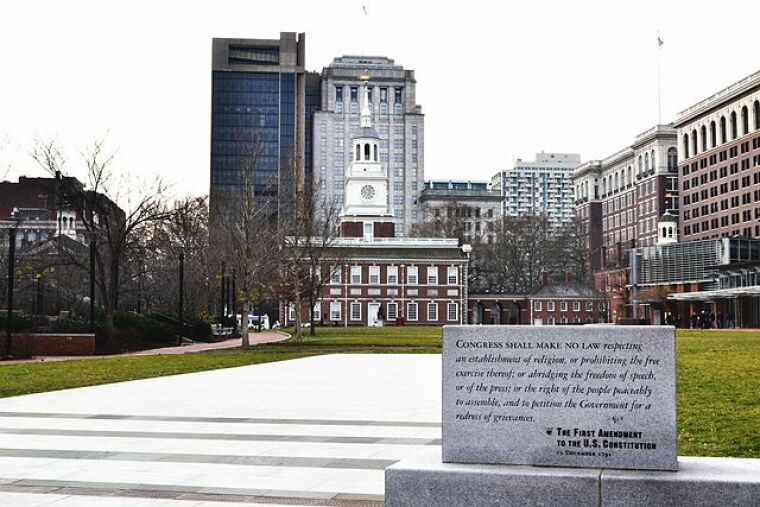Poll: Some Americans believe Muslims, atheists are not protected under First Amendment

Some Americans believe that Muslims and atheists are not protected under the First Amendment to the U.S. Constitution, according to a recent poll.
A survey by the University of Pennsylvania's Annenberg Public Policy Centre has found that 22 percent do not believe or do not know if Muslims in the U.S. had First Amendment rights.
Seventy-percent of Americans said that it was very or somewhat accurate to say their Muslim countrymen have the same rights as other citizens. Eighteen percent said it was very or somewhat inaccurate, while four percent said they did not know.
When the respondents were asked the same question regarding atheists, 79 percent said that it was very accurate or somewhat accurate. Fifteen percent said it was very or somewhat inaccurate and five percent said they did not know.
According to Religion News Service, 15 percent named freedom of religion when asked to name the rights guaranteed under the First Amendment. Just under half were able to name freedom of speech as a guaranteed right.
The First Amendment, which bans Congress from passing laws that discriminate against people of specific religious faiths, states: "Congress shall make no law respecting an establishment of religion, or prohibiting the free exercise thereof; or abridging the freedom of speech, or of the press; or the right of the people peaceably to assemble, and to petition the Government for a redress of grievances."
Thirty-seven percent of the respondents were unable to name any of the rights that are protected under the amendment.
"These results emphasize the need for high-quality civics education in the schools and for press reporting that underscores the existence of constitutional protections," said Kathleen Hall Jamieson, director of the Annenberg Public Policy Center.
As many of 53 percent wrongly thought that undocumented immigrants do not have constitutional rights.
The matter was settled more than 130 years ago when the U.S. Supreme Court ruled in the Yick Wo v. Hopkins case that the 14th Amendment's equal protection clause extends to noncitizens.
In the Zadvydas v. Davis case in 2001, the high court ruled that "due process" of the 14th Amendment applies to all aliens whose presence in the country is "unlawful, involuntary or transitory."
Other findings indicated that only 26 percent could name all three branches of the government, the same as last year's study.
The annual study was conducted on Sept. 17, ahead of Constitution Day, which was observed on Monday, Sept. 18, the anniversary of its signing in 1787. The survey, which included a sample size of 1,013 American adults, has a margin of error of plus or minus 3.7 percentage points.
 Christians don't have to affirm transgenderism, but they can’t express that view at work: tribunal
Christians don't have to affirm transgenderism, but they can’t express that view at work: tribunal Archaeology discovery: Medieval Christian prayer beads found on Holy Island
Archaeology discovery: Medieval Christian prayer beads found on Holy Island Presbyterian Church in America votes to leave National Association of Evangelicals
Presbyterian Church in America votes to leave National Association of Evangelicals Over 50 killed in 'vile and satanic' attack at Nigerian church on Pentecost Sunday
Over 50 killed in 'vile and satanic' attack at Nigerian church on Pentecost Sunday Ukrainian Orthodox Church severs ties with Moscow over Patriarch Kirill's support for Putin's war
Ukrainian Orthodox Church severs ties with Moscow over Patriarch Kirill's support for Putin's war Islamic State kills 20 Nigerian Christians as revenge for US airstrike
Islamic State kills 20 Nigerian Christians as revenge for US airstrike Man who served 33 years in prison for murder leads inmates to Christ
Man who served 33 years in prison for murder leads inmates to Christ


 Nigerian student beaten to death, body burned over ‘blasphemous’ WhatsApp message
Nigerian student beaten to death, body burned over ‘blasphemous’ WhatsApp message 'A new low': World reacts after Hong Kong arrests 90-year-old Cardinal Joseph Zen
'A new low': World reacts after Hong Kong arrests 90-year-old Cardinal Joseph Zen Iran sentences Christian man to 10 years in prison for hosting house church worship gathering
Iran sentences Christian man to 10 years in prison for hosting house church worship gathering French Guyana: Pastor shot dead, church set on fire after meeting delegation of Evangelicals
French Guyana: Pastor shot dead, church set on fire after meeting delegation of Evangelicals ‘Talking Jesus’ report finds only 6% of UK adults identify as practicing Christians
‘Talking Jesus’ report finds only 6% of UK adults identify as practicing Christians Mission Eurasia ministry center blown up in Ukraine, hundreds of Bibles destroyed: 'God will provide'
Mission Eurasia ministry center blown up in Ukraine, hundreds of Bibles destroyed: 'God will provide' Church holds service for first time after ISIS desecrated it 8 years ago
Church holds service for first time after ISIS desecrated it 8 years ago Burger King apologizes for 'offensive campaign' using Jesus' words at the Last Supper
Burger King apologizes for 'offensive campaign' using Jesus' words at the Last Supper Uganda: Muslims abduct teacher, burn him inside mosque for praying in Christ’s name
Uganda: Muslims abduct teacher, burn him inside mosque for praying in Christ’s name